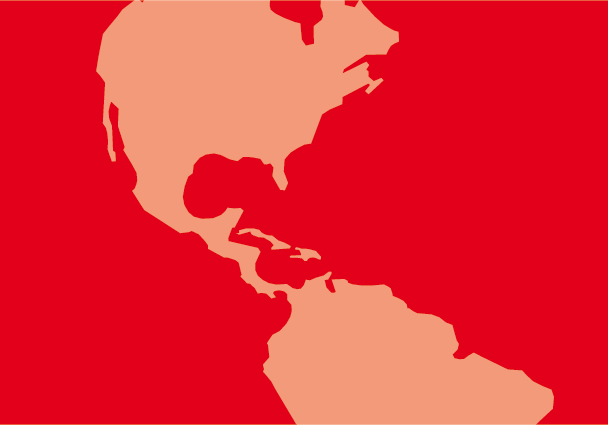
Dec 13, 2012 | News
Following recent attacks against the independence of the judiciary in several Central American countries, the ICJ issued today a strong position statement (in Spanish).
La CIJ ante los últimos acontecimientos que afectan seriamente la independencia de los differentes poderes judiciales en países de la región centroamericana, expresa:
- Durante el año 2012, la CIJ ha constatado que los diferentes gobiernos y autoridades de los países de Centroamérica han realizado actos que afectan seriamente la independencia judicial. En Honduras, el miércoles 12 de diciembre, la Asamblea Legislativa procedió a destituir a cuatro magistrados de la Sala Constitucional de la Corte Suprema de Justicia, sin tener facultades o atribuciones para un acto de esta naturaleza. Esta destitución nos sitúa frente a un escenario similar al del Golpe de Estado de junio de 2009;
- En El Salvador, se han dado hechos similares; durante todo el año 2012, la Asamblea Legislativa y otros grupos del poder político, han pretendido desarticular la Sala Constitucional de la Corte Suprema de dicho país, debido al contenido de sus sentencias; en Costa Rica hace unas semanas, también la Asamblea Legislativa se negó a ratificar en su cargo a un magistrado de la Sala Constitucional de la Corte Suprema de Justicia, alegando que los fallos de dicha sala creaban una “situación de ingobernabilidad” y que ese acto era un “llamado de atención para el resto de los magistrados”, siendo la primera vez que el Organismo Legislativo se negó a ratificar en su cargo un nuevo mandato de un magistrado del alto Tribunal;
- En Guatemala, tanto el Presidente de la Cámara Penal de la Corte Suprema de Justicia como la Fiscal General, vienen siendo objeto de ataques a su independencia por parte de abogados defensores de las personas acusadas, por la función positiva que han cumplido en la lucha contra la impunidad en casos de graves violaciones a los derechos humanos cometidas durante el conflicto armado;
La CIJ considera que todos estos hechos constituyen injerencias y ataques a la independencia del Poder Judicial; tratándose de magistrados de diferentes Cortes Supremas y de una Fiscal General, estos actos evidencian por sí mismos, la precariedad de la garantía de independencia judicial en dichos países. A esta situación, hay que agregar que varios de los países mencionados, carecen de sistemas de carrera judicial y de mecanismos de protección adecuados para garantizar a los funcionarios el ejercicio independiente de la función jurisdiccional; además, en ellos existen fenómenos de impunidad generalizados y de cuerpos ilegales, aparatos clandestinos de seguridad y crimen organizado.
Frente a estos hechos, la CIJ recomienda:
- Que las autoridades estatales concernidas con los hechos arriba mencionados, se abstengan de interferir en el ámbito de la independencia de los poderes judiciales, ya que de lo contrario, estarían incumpliendo sus obligaciones internacionales sobre respeto a la independencia de poderes, establecidas en la Convención Americana sobre Derechos Humanos y en el Pacto Internacional de Derechos Civiles y Políticos;
- Que se tomen las medidas necesarias para asegurar la independencia de jueces, magistrados y fiscales como corresponde en un Estado de Derecho;
- Que los estados relacionados establezcan mecanismos de protección para jueces, magistrados, fiscales y demás operadores de justicia, a fin de salvaguardar su integridad y garantizar el ejercicio de la función jurisdiccional independiente;
- Que los estados concernidos impulsen procesos de creación o fortalecimiento de carreras judiciales de conformidad con los estándares internacionales;
- Que se fortalezcan los poderes judiciales y otras entidades del sector justicia, a fin de lograr la efectiva protección de los derechos humanos incluida la lucha contra la impunidad.
La CIJ continuará cumpliendo con su mandato de promover y garantizar la independencia de jueces, abogados y fiscales; en ese sentido, le dará seguimiento a estas situaciones y continuará observando y proponiendo soluciones a esta problemática.
Para mayor información :
Ramón Cadena Rámila, Director de la Comisión Internacional de Juristas para Centro América, t + 502 30441818
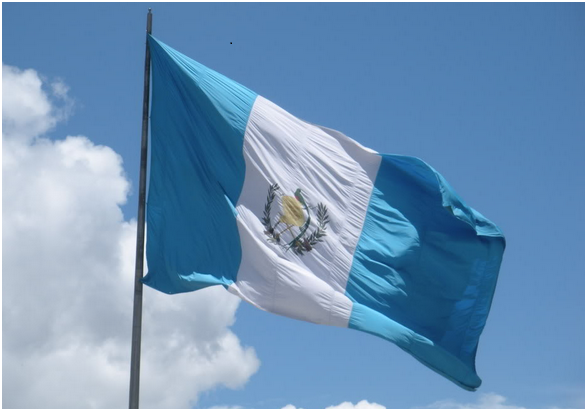
Sep 18, 2012 | Events
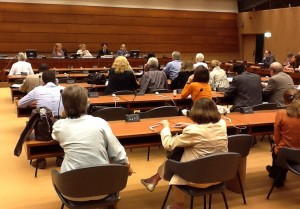 In the margins of the UN Human Rights Council’s 21st regular session, the Centre Europe-Tiers Monde (CETIM) and the ICJ today held a parallel event on impunity and exploitation of natural resources in Guatemala.
In the margins of the UN Human Rights Council’s 21st regular session, the Centre Europe-Tiers Monde (CETIM) and the ICJ today held a parallel event on impunity and exploitation of natural resources in Guatemala.
The event discussed the overall question of justice for indigenous communities in Guatemala. It was followed by the showin of excerpts from Grégory Lassalle’s documentary Des déreives de l’art aux dérivés du pétrole.
Panellists included Ramón Cadena, Director of the ICJ Central America Programme; Hilda Ventura and Mario Mucú, representatives of the Maya communities of San Andrés and Petén; and Melik Özden, UN Representative and Co-Director of CETIM.
HRC21-ParallelEvent-Guatemala-2012 (download flyer, in PDF)
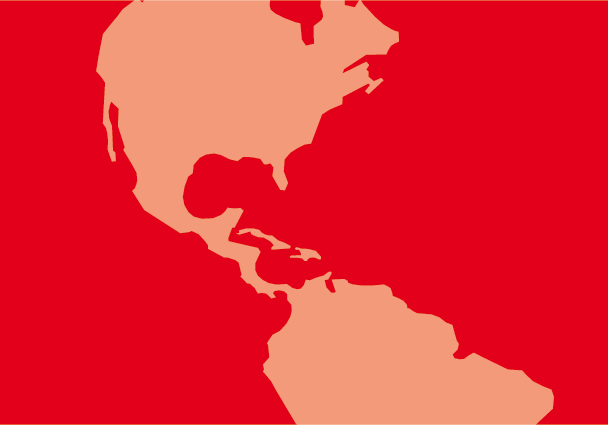
Sep 7, 2012 | News
Comunicado de prensa sobre la estrategia de desprestigio que sufren jueces y fiscales que luchan contra la impunidad.
Los días 3 al 6 de septiembre de 2012, la CIJ llevó a cabo entrevistascon el Pleno de la Corte Suprema de Justicia, la Fiscal General, abogados litigantes, fiscales, jueces, con la Asociación de Jueces y Magistrados del Organismo Judicial (AJMOJ), Colegio de Abogados y con diferentes organizaciones de la Sociedad Civil, con el objeto de recabar información acerca de la estrategia de desprestigio que sufren jueces y fiscales que luchan contra la impunidad en Guatemala y de las actuaciones judiciales que se están llevando a cabo para investigar y castigar los crímenes cometidos durante el conflicto armador o.
Guatemala-pronunciamento CIJ-press release-2012-spa (full text in pdf)
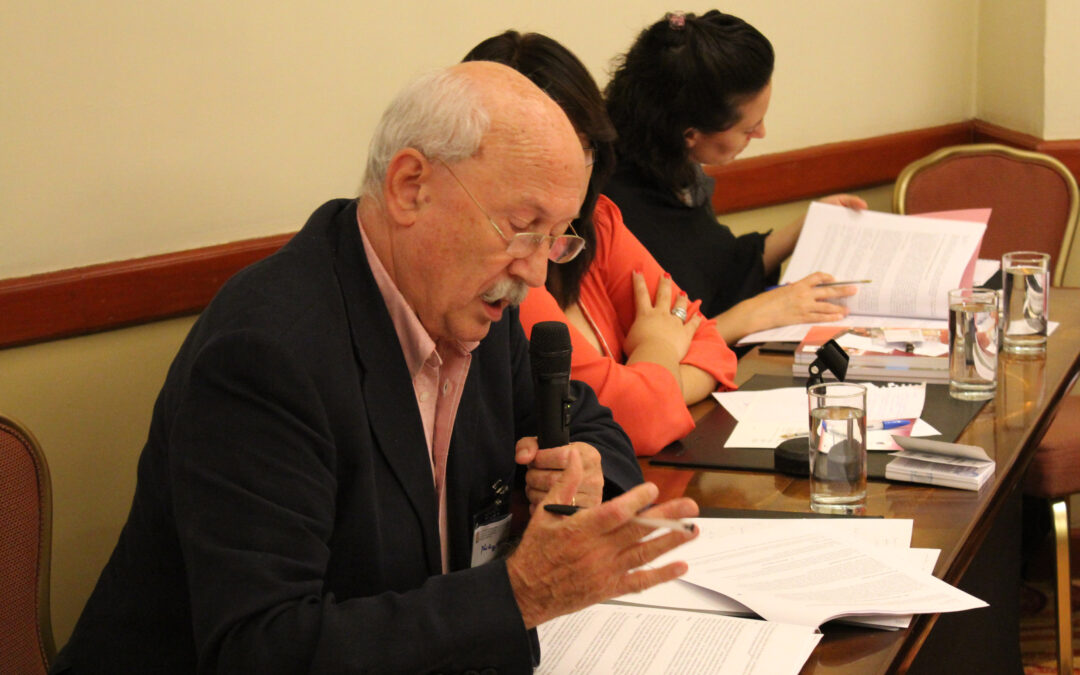
Aug 20, 2012 | News
With the support of ICJ Commissioner Justice Philippe Texier, the ESCR Programme and the Central America Regional Office organized a two-day workshop in San Salvador on August 16 and 17, 2012.
A group of 25 representatives of human rights and development NGOs as well as trade unions, lawyers and academic experts participated in a first consultation on access to justice for victims of violations of economic, social and cultural rights.
The discussions tackled obstacles and advances in the field of access to justice with regard to the legal and institutional frameworks, as well as in the administration of justice and material issues.
Coming from very different backgrounds, the participants valued the opportunity to work together and share their experience related to economic, social and cultural rights (ESCR) of a variety of rights-holders and their attempts to seek justice.
This first consultation and workshop will be followed by other activities in the course of the national project.
Background of the workshop
With national projects such as the one in El Salvador, the ICJ programme on Economic, Social and Cultural Rights aims at contributing to improve accountability for human rights violations and access to justice for all, including for victims of threats against and violations of economic, social and cultural rights.
The ICJ has embarked on research processes at national level to identify obstacles and opportunities for access to justice, as well as on consultation and collaboration processes with national allies to define strategies to address gaps.
Depending on the needs identified, the ICJ will support the implementation of recommendations and steps that includes trainings and legal interventions.
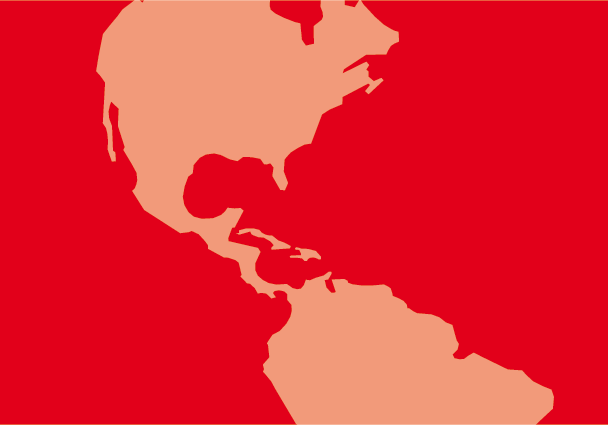
Apr 12, 2012 | News
 La CIJ y el Observatorio expresaron su preocupación común por la continuada privación arbitraria de libertad de la Jueza María Lourdes Afiuni y por los actos de intimidación y amenazas contra los abogados que la defienden.
La CIJ y el Observatorio expresaron su preocupación común por la continuada privación arbitraria de libertad de la Jueza María Lourdes Afiuni y por los actos de intimidación y amenazas contra los abogados que la defienden.
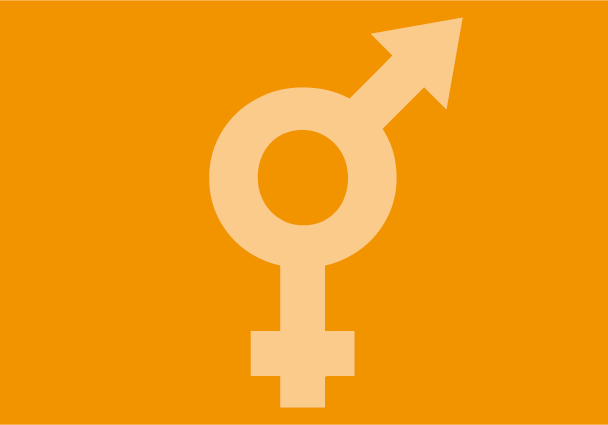
Mar 23, 2012 | News
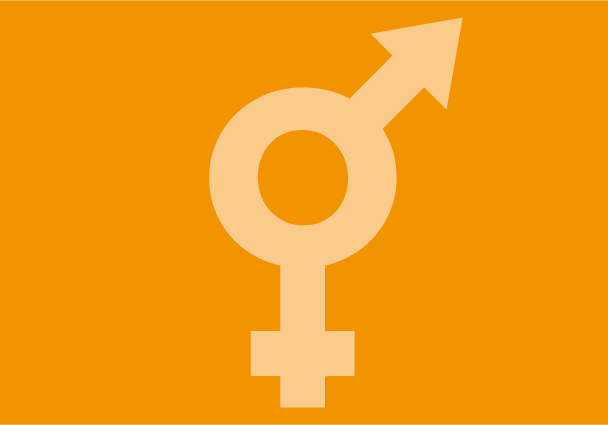 The ICJ is pleased with the decision of the Inter-American Court of Human Rights that parental sexual orientation is not a factor in child custody cases.
The ICJ is pleased with the decision of the Inter-American Court of Human Rights that parental sexual orientation is not a factor in child custody cases.
On 20 March the Inter-American Court of Human Rights ruled that parental sexual orientation is not a factor in child custody cases and that Chile had violated Karen Atala’s rights to equality, non-discrimination and privacy when the Supreme Court of Chile removed custody of her three daughters from her because she had begun a relationship with another woman.
In its first sexual orientation case, the Court held that sexual orientation is a protected ground, included under “other social condition” in Article 1 of the American Convention on Human Rights.
The Court further stated that the best interests of the child test could not be used as a pretext for prohibited discrimination in custody cases.
The Court also found that the Supreme Court of Chile’s reliance on stereotypes and prejudices was a violation of the State’s obligation to protect rights. Finally, the Court stated that the American Convention did not protect a specific form of traditional family and that states must recognize diverse family structures.
The International Commission of Jurists was called by the Inter-American Commission as an expert and submitted written and oral testimony on the role of parental sexual orientation as a factor in child custody cases.
Decision:
(http://www.corteidh.or.cr/docs/casos/articulos/seriec_239_esp.pdf)
Expert Submission:
(https://www.icj.org/dwn/database/Jernow%20Written%20Submission.pdf)













